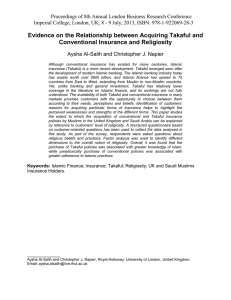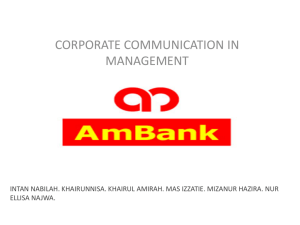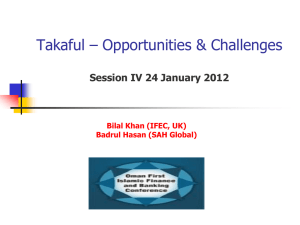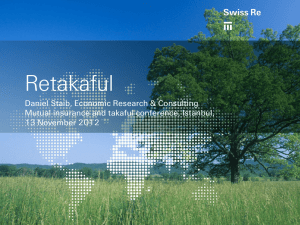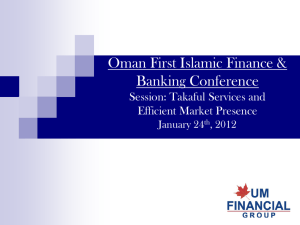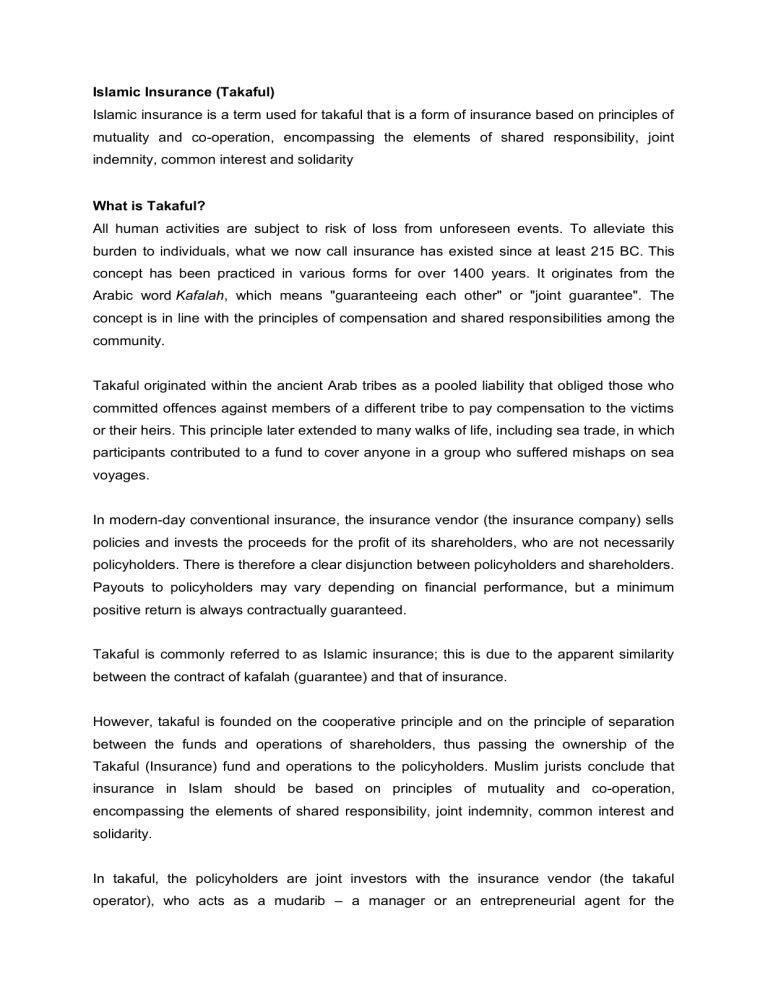
Islamic Insurance (Takaful) Islamic insurance is a term used for takaful that is a form of insurance based on principles of mutuality and co-operation, encompassing the elements of shared responsibility, joint indemnity, common interest and solidarity What is Takaful? All human activities are subject to risk of loss from unforeseen events. To alleviate this burden to individuals, what we now call insurance has existed since at least 215 BC. This concept has been practiced in various forms for over 1400 years. It originates from the Arabic word Kafalah, which means "guaranteeing each other" or "joint guarantee". The concept is in line with the principles of compensation and shared responsibilities among the community. Takaful originated within the ancient Arab tribes as a pooled liability that obliged those who committed offences against members of a different tribe to pay compensation to the victims or their heirs. This principle later extended to many walks of life, including sea trade, in which participants contributed to a fund to cover anyone in a group who suffered mishaps on sea voyages. In modern-day conventional insurance, the insurance vendor (the insurance company) sells policies and invests the proceeds for the profit of its shareholders, who are not necessarily policyholders. There is therefore a clear disjunction between policyholders and shareholders. Payouts to policyholders may vary depending on financial performance, but a minimum positive return is always contractually guaranteed. Takaful is commonly referred to as Islamic insurance; this is due to the apparent similarity between the contract of kafalah (guarantee) and that of insurance. However, takaful is founded on the cooperative principle and on the principle of separation between the funds and operations of shareholders, thus passing the ownership of the Takaful (Insurance) fund and operations to the policyholders. Muslim jurists conclude that insurance in Islam should be based on principles of mutuality and co-operation, encompassing the elements of shared responsibility, joint indemnity, common interest and solidarity. In takaful, the policyholders are joint investors with the insurance vendor (the takaful operator), who acts as a mudarib – a manager or an entrepreneurial agent for the policyholders. The policyholders share in the investment pool's profits as well as its losses. A positive return on policies is not legally guaranteed, as any fixed profit guarantee would be akin to receiving interest and offend the prohibition against riba. For some time conventional insurance was considered to be incompatible with the Shari’ah that prohibit excessive uncertainty in dealings and investment in interest-bearing assets; both are inherent factors in conventional insurance business. However, takaful complies with the Shari’ah (which outlines the principles of compensation and shared responsibilities among the community) and has been approved by Muslim scholars. There is now general, health and family (life) takaful plans available for the Muslim communities. Prohibitions of Gharar, Maysir and Riba Gharar: An insurance contract contains gharar because, when a claim is not made, one party (insurance company) may acquire all the profits (premium) gained whereas the other party (participant) may not obtain any profit whatsoever. Ibn Taimiyah, a leading Muslim scholar, further reasoned "Gharar found in the contract exists because one party acquired profit while the other party did not". The prohibition on gharar would require all investment gains and losses to eventually be apportioned in order to avoid excessive uncertainty with respect to a return on the policyholder's investment. Maysir: Islamic scholars have stated that maysir (gambling) and gharar are inter-related. Where there are elements of gharar, elements of maysir is usually present. Maysir exists in an insurance contract when; the policy holder contributes a small amount of premium in the hope to gain a larger sum; the policy holder loses the money paid for the premium when the event that has been insured for does not occur; the company will be in deficit if the claims are higher that the amount contributed by the policy holders. Riba: Conventional endowment insurance policies promising a contractually-guaranteed payment, hence offends the riba prohibition. The element of riba also exists in the profit of investments used for the payment of policyholders’ claims by the conventional insurance companies. This is because most of the insurance funds are invested by them in financial instruments such as bonds and stacks which may contain elements of Riba. Gambling and Insurance Gambling and insurance are two distinct and different operations. Gambling is speculative in its risk assessment whereas insurance is a pure risk and is non-speculative. In gambling, one may win or lose by creating that risk. In insurance, the risk is already there and one is trying to minimise the financial effects of that risk. Insurance shifts the impact of that risk to someone else and relieves the person of risk. The risk nevertheless still remains. While gambling promotes dissension, ruin and hatred, insurance based on cooperative principles, enables the insured to lessen the financial impact without which it could drive the individual and his dependents to poverty, thereby weakening their place in the society. There is nothing in Islam that prevents individuals from making a provision for their dependents. Seen collectively for large groups of insured population, insurance strengthens the financial base of the society. Islamic scholar, Yusuf Ali, in his translation of The Holy Qur’an, comments on Sura (chapter) Al-Baqara, ayat (verse) 219, "Insurance is not gambling, when conducted on business principles. Here the basis for calculation is statistics on a large scale, from which mere chance is eliminated. The insurers charge premium in proportion to the risks, exactly and scientifically calculated". Basis and Principles of Takaful Islamic insurance requires each participant to contribute into a fund that is used to support one another with each participant contributing sufficient amounts to cover expected claims. The underlying principles of Takaful may be summarised as follows: Policyholders co-operate among themselves for their common good. Every policyholder pays a part of the contribution as a donation to help those that need assistance. Losses are divided and liabilities spread according to the community pooling system. Uncertainty is eliminated in respect of subscription and compensation. It does not seek to derive advantage at the cost of others. Theoretically, Takaful is perceived as cooperative insurance, where members contribute a certain sum of money to a common pool. The purpose of this system is not profits but to uphold the principle of "bear ye one another's burden." Why No to Conventional Insurance In modern business, one of the ways to reduce the risk of loss due to misfortunes is through insurance. The concept of insurance where resources are pooled to help the needy does not necessarily contradict Islamic principles. Three important differences distinguish conventional insurance from Takaful: 1. Conventional insurance involves the elements of excessive uncertainty (gharar) in the contract of insurance; 2. Gambling (maysir) as the consequences of the presence of excessive uncertainty that rely on future outcomes 3. Interest (riba) in the investment activities of the conventional insurance companies; 4. Conventional insurance companies are motivated by the desire for profit for the shareholders; 5. Conventional system of insurance can be subject to exploitation. For example, it is possible to charge high premium (especially in monopolistic situations) with the full benefit of such over-pricing going to the company. The key difference between Takaful and conventional insurance rests in the way the risk is assessed and handled, as well as how the Takaful fund is managed. Further differences are also present in the relationship between the operator (under conventional insurance using the term: insurer) and the participants (under conventional it is the insured or the assured). Takaful business is also different from the conventional insurance in which the policyholders, rather than the shareholders, solely benefit from the profits generated from the Takaful and Investment assets. How does Takaful Work All participants (policyholders) agree to guarantee each other and, instead of paying premiums, they make contributions to a mutual fund, or pool. The pool of collected contributions creates the Takaful fund. The amount of contribution that each participant makes is based on the type of cover they require, and on their personal circumstances. As in conventional insurance, the policy (Takaful Contract) specifies the nature of the risk and period of cover. The Takaful fund is managed and administered on behalf of the participants by a Takaful Operator who charges an agreed fee to cover costs. These costs include the costs of sales and marketing, underwriting, and claims management. Any claims made by participants are paid out of the Takaful fund and any remaining surpluses, after making provisions for likely cost of future claims and other reserves, belong to the participants in the fund, and not the Takaful Operator, and may be distributed to the participants in the form of cash dividends or distributions, alternatively in reduction in future contributions. Operating Principles An Islamic insurance company must have the following operating principles: 1. It must operate according to Islamic co-operative principles. 2. Reinsurance commission may be paid to, or received from, only Islamic insurance and reinsurance companies. 3. The insurance company must maintain two funds: a participants/policyholders' fund and a shareholders' fund. THE POLICYHOLDERS' FUND 1. The assets of the policyholders' fund consist of: i. Insurance premiums received ii. Claims received from re-insurers iii. Such proportion of the investment profits attributable to policyholders as may be allocated to them by the Board of Directors. iv. Salvages and recoveries v. Consultancy and other receipts. 2. All the claims payable to the policyholders, reinsurance costs, technical reserves, administrative expenses, etc., excluding the expenses of the investment department, shall be met out of the policyholders' fund. 3. The balance standing to the credit of the policyholders' fund at the end of the year represents their surplus. The General Assembly may allocate the whole or part of the surplus to the policyholders' special reserves. If a part, the balance will be distributed among the policyholders. 4. When the policyholders' funds are insufficient to meet their expenses, the deficit is funded from the shareholders' fund. 5. The shareholders undertake to discharge all the contractual liabilities of the policyholders' fund, but this liability does not exceed their equity in the company. THE SHAREHOLDERS' FUND 1. The assets of the shareholders' fund consist of: i. Paid-up capital and reserves attributable to shareholders ii. Profit on the investment of capital and shareholders' reserves iii. Such proportion of the investment profit generated by the investment of the policyholders' fund and technical and other reserves as is attributable to them iv. Miscellaneous receipts 2. All the administrative expenses of the investment department are deducted from the Shareholders' Fund. 3. The balance of the shareholders' surplus, if any, is distributed among them. INVESTMENT OF FUNDS The company may invest its funds only on a profit-and-loss-sharing basis, as approved by the Shari'ah. Products and Services Offered by Islamic Insurance Companies Islamic insurance companies may offer competitively priced products, without curtailing the scope and benefit of insurance coverage made traditionally available to the public by conventional insurance companies. As regards life insurance facilities, Islamic insurance companies have developed Islamic Trust Funds for social sol idarity, mortgage protection, student protection and employers' protection. MODELS OF TAKAFUL There are various models of takaful according to the nature of the relationship between the company and the participants. There are wakalah (agency), mudarabah and a combination of the two. In the Sudanese takaful model, every policyholder is a shareholder in it. An Operator runs the business on behalf of the participants and no separate entity manages the business. Shari'ah experts consider this preferable. In other Islamic countries, the legal framework does not allow this arrangement and takaful companies work as separate entities on the basis of mudarabah (in Malaysia) and wakalah (in the Middle East). In the mudarabah model practised mainly in the Asia Pacific region, the policyholders receive any available profit on their part of the funds only. The Shari'ah committee of a takaful company approves the sharing ratio for each year in advance, most of the expenses being charged to the shareholders. In the wakalah model, the surplus of policyholders' investments – net of the management fee or expenses - goes to the policyholders. The shareholders charge the wakalah fee from contributions and this covers most of the expenses of the business. The fee is fixed annually in advance in consultation with the company's Shari'ah Supervisory Board. The management fee is related to performance. Differences between Takaful and Conventional Insurance The overwhelming majority of Islamic jurists have concluded that the conventional insurance contract is unacceptable to Islam, not being in conformity with the Shari'ah for the following main reasons: 1. it includes an element of al-gharar (uncertainty) 2. it is based on the theory and practice of interest; a conventional life insurance policy is based on interest, while an Islamic model is based on tabarru where a part of the contributions by participants are treated as donation. For this reason, policy holders in takaful are usually referred to as participants. 3. it is a form of gambling. First and foremost, Islamic insurance, in conformance with the Islamic Shari'ah, is a form of social solidarity (takaful), based on the principles of trusteeship and co-operation. 1. In conventional insurance, the insured substitutes certainty for uncertainty. In return for a predetermined payment, the premium, he/she transfers to the insurer the possible economic losses from stipulated risks. In Islamic insurance, the participants share all risks mutually and no transfer of risk is involved. 2. Conventional insurance companies are motivated by the desire for profit, while Islamic insurance companies are non-profit making, the shareholders not being entitled to share in the profits of the business although they are entitled to charge fees for their services and share in the investment returns of funds managed by them 3. The policy-holders in a conventional insurance company have no right to vote in the elections of the directors of the company or to see the annual accounts of the company, while in Islamic companies; these facilities are available to all participants who pay a certain stipulated amount of premiums (contributions). 4. In the takaful system, if the assured dies before the policy matures, the beneficiary is entitled to the whole amount of the premiums, the bonus and dividend and a share of the profits made over the paid premiums, plus a donation from the company out of the participants/policy-holder's contributions given on the basis of tabarru. Such a transaction is seen as a mutual contribution towards the welfare of the helpless in society. Where the insured is still alive on the maturing of the policy, he/she is entitled to the whole amount of the premiums, a share of the profit made over the premiums, a bonus and dividends according to the company policy. 5. In a conventional life insurance policy, the agent's payments are paid out of the insured's paid premiums, whereas in the Islamic model, the agents work for the company and thus are paid by the company. 6. The insurable interest in the conventional system is usually paid to the policyholder, if he/she is alive at the expiry of the policy. If he/she dies before that date, the insurable interest is paid to the beneficiaries, who may include including family, servants, company, trustee, partners, mortgagor, etc. But under the Islamic model, the insurable interest goes to the assured or his/her heirs, according to the principles of Mirth or Wasiyyah. The concept of tabarru' in takaful The concept of "tabarru" (takaful donation) is the pillar under the takaful system. The word tabarru literally means donation. It is a "shared responsibility and guarantee" principle of takaful. This is the most important factor which distinguished takaful from conventional insurance. It is "Amalus Saleh" (good deed) of the participant, through helping each other. The underlying concept of tabarru in takaful contract is different from the literal understanding of hibah (gift) or sadaquah (charity). Tabarru is actually a donation which is conditional to provide assistance and compensation to participants of the takaful scheme. It is an obligation and commitment to pay the defined amount. Shariah allows that a donation may be restricted by or subjected to certain terms and conditions, and may be allocated for specific purposes. From an actuary's perspective, the tabarru is the participant's contribution to a risk pool that ultimately will be used to pay specified claims of participants who contribute in the pool. The risk pool can pay for claim to participants who has duly paid his tabarru. The risk pool is not accessible to others. The amount of tabarru need to be determined by an actuary, who will determine it by using a cash flow model from observance of past experience and mortality table. The amount of tabarru is fixed by estimating the risk that the participant brings to the takaful risk pool. The actuary should try to ensure that all participants contribute fairly to the risk pool. The tabarru is calculated mathematically as sufficient to cover the risk in commensuration with the probability of claim. In "general takaful" and "family takaful" business, tabarru is a contract where a participant agrees to donate a predetermined percentage of his contribution to a Takaful fund. This concept eliminates the element of gharar (uncertainly) from the takaful contract. One reason, conventional insurance is considered not permissible in Sharia is that there are elements of uncertainty (gharar) in the insurance exchange contract. In conventional insurance, for a certain premium, the insured is covered for financial loss on the occurrence of a contingent event.In this contract, both the amount of financial loss and whether the insured event will occur are uncertain. To address this issue, concept of tabarru has been incorporated in the takaful system, whereby a donation is being paid into the takaful fund for the purpose. Tabarru, under takaful system, is not a premium for meeting loss, but a donation i.e. gratuitous contribution for a noble purpose to help each other. The money collected from each member or participant is to be used for the purpose of assisting fellow participants who require assistance according to the terms agreed and as long as these terms are not in conflict with Shariah. It is the principle of shared responsibility and shared guarantee of the participants for a common cause. Wherever, one of the members suffers a defined loss and makes a legitimate claim, takaful operators would settle the claim by using funds from the tabarru pool. In case of retakaful, the contribution for retakaful shall also be paid from this pool fund. In the meantime, the funds in the pool are to be invested in Shariah compliant investment portfolio. Islam accepts and allows this principle of reciprocal compensation approach and joint guarantee. Co-operative Insurance The concept of co-operative insurance is acceptable in Islam because: 1. The policyholders co-operate actively for their common good; 2. Every policyholder pays his subscription in order to help those who need it; 3. It spreads liability in the community by a pooling system; 4. It does not aim at deriving undue advantage for one at the cost of other individuals; 5. The element of uncertainty is eliminated as far as determination of the premiums is concerned. An Islamic co-operative insurance contract should embody the following conditions: 1. The company functions according to Islamic co-operative principles. 2. The policyholders have the right to participate in surplus profits and are liable to contribute additional amounts if their subscriptions are not sufficient to meet all the losses. However, it is preferable for such losses to be written off against future surpluses. Shareholders are not entitled to any of the underwriting profits generated by the insurance operations. But, as mudarib (agents), they are entitled to receive a proportion of the profits from the investment of insurance funds, plus, of course, all the profits on the investment of their own capital and any other funds and reserves attributable to them. 3. The company will strictly follow Islamic laws in the matter of investment and will not indulge in the practice of usury. 4. Policyholders are represented on the Board of Directors and have a right to scrutinise its accounts. Gambling and Insurance There are three main differences between a gambling contract and an insurance contract. 1. In a gambling contract, neither party has any other interest than winning a sum of money. The gambler is not being indemnified against any loss. But, in an insurance contract, the insured's right to be paid depends on his suffering loss from the insured peril. In other words, an insurance contract is a contract of indemnity, which is nonexistent in a gambling contract. 2. In the case of gambling, one party must win and the other loses. In insurance, on the other hand, the event entitling the insured to compensation may or may not happen during the period of the policy, but he pays a premium for being protected during that time. 3. If a gambler wins, he gets back not only his original stake but also an additional amount without suffering any loss, whereas an insured person never gets back his premium and is only indemnified to the extent that he has suffered damage. Pricing Transactions linked to Interest-rate Benchmark There are continuing debates on whether the spirit of Shari`ah is being violated by the practice of "benchmarking" linked interest rate benchmark such as London Interbank Offered rate (LIBOR) plus an agreed mark-up in also pricing returns on Islamic finance transactions . At a very fundamental level, the reason for the debates is the lack of understanding to clearly discern the difference between the use of LIBOR as a benchmark for pricing and the use of non-Shari’ah compliant assets as a determinant for returns. However, benchmarking touches upon the integrity of Islamic Finance as a whole, and the concept of Shari’ah-compliance vs Shari’ah-based approach in particular. There are practical challenges delaying a switch to participation-based structures, such as Musharakah and Mudarabah, that require financiers to participate in the underlying asset in a financing transaction. Retakaful or Reinsurance Frequently, the scale of insurance risks underwritten is too great for one insurer to carry safely. In these circumstances, companies use reinsurance to mitigate their own risk exposure. When insurers insure a risk again with another company, it is called reinsurance which allows the insurance industry to spread its losses, lessening the impact of claims on any one company. Most insurance companies have to spread their liabilities among other insurance companies, which are called reinsurance companies. The reinsurance contract, for Islamic companies, must be contracted in conformity with the Shari'ah. There is currently a shortage of retakaful capacity and the lack of companies in the market presents a challenge as well as an opportunity. The challenge is to have a large enough takaful market to justify retakaful business. There is also a global need for strong and credible retakaful operators to assist the growth and expansion of takaful business. Shari’ah scholars have allowed takaful operators to reinsure conventionally when no retakaful alternative is available, although retakaful is strongly preferred. However, this conventional reinsurance represents a dilemma, as it is contrary to the customer’s preference of seeking cover on Islamic principles. Structurally retakaful operating principles are similar to the takaful operating principles, and the same Shari’ah principles apply. Preference must be given to Islamic reinsurance companies. The aim should be to end relations with conventional commercial reinsurance companies as soon as possible. SHARI'AH SUPERVISORY BOARD [RELIGIOUS BOARD] The role of Shari’ah Supervisory Board members is to review the takaful / retakaful operations, supervise its development of Islamic insurance products, and determine the Shari’ah compliance of these products and the investments. The Shari’ah Supervisory Board have to carry their own independent audit and certify that nothing relating to any of the operations involve any element that is prohibited by Shari’ah. Islamic financial institutions must adhere to the best practices of corporate governance however they have one extra layer of supervision in the form of religious boards. The religious boards have both supervisory and consultative functions. Since the Shari’h scholars on the religious boards carry great responsibility, it is important that only high calibre scholars are appointed to the religious boards. An Islamic financial institution is required to establish operating procedures to ensure that no form of investment or business activity is undertaken that has not been approved in advance by the religious board. The management is also required to periodically report and certify to the religious board that the actual investments and business activities undertaken by the institution conform to forms previously approved by the religious board. Islamic financial institutions that offer products and services conforming to Islamic principles must, therefore, be governed by a religious board that act as an independent Shari’ah Supervisory Board comprising of at least three Shari’ah scholars with specialised knowledge of the Islamic laws for transacting, fiqh al mu`amalat, in addition to knowledge of modern business, finance and economics. They are responsible primarily to give approval that banking and other financial products and services offered comply with the Shari’ah and subsequent verification that of the operations and activities of the financial institutions have complied with the Shari’ah principles (a form of post Shari’ah audit). The Shari’ah Supervisory Board is required to issue independently a certificate of Shari’ah compliance. The day-to-day application of Shari’ah by the Shari’ah Supervisory Boards is two-fold. First, in the increasingly complex and sophisticated world of modern finance they endeavours to answer the question on whether or not proposals for new transactions or products conform to the Shari’ah. Second, they act to a large extent in an investigatory role in reviewing the operations of the financial institution to ensure that they comply with the Shari’ah. The concept of collective decision-making, in other words, decisions made by more than one scholar, is especially important. Shari’ah Supervisory Boards function is to ensure that decisions are not unilateral, and that difficult issues of finance receive adequate consideration by a number of qualified people. Shaikh Yusuf Talal DeLorenzo, Islamic scholar, position is that unless a financial product or service can be certified as Shari’ah compliant by a competent Shari’ah supervisory board, that product's authenticity is dubious. At that point, it will be the responsibility of the individual investor or consumer to determine on his or her own that the product complies with the principles and precepts of the Shari’ah.
